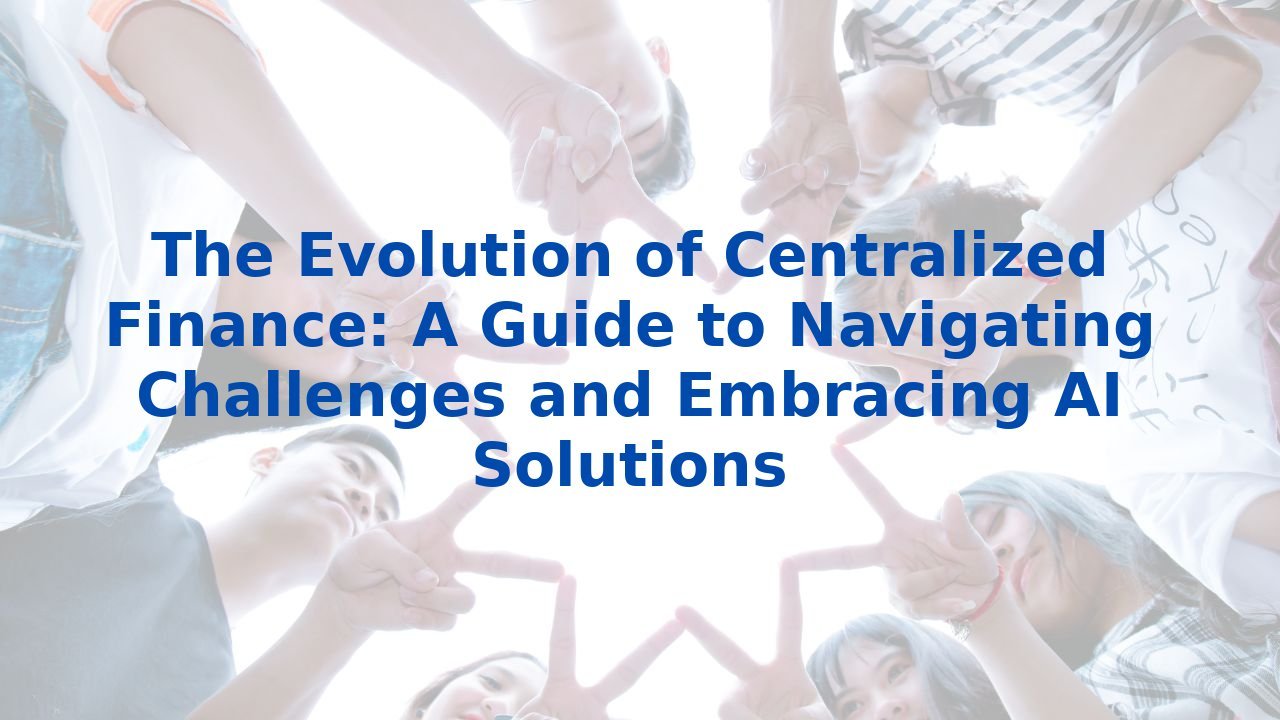The Evolution of Centralized Finance: A Guide to Navigating Challenges and Embracing AI Solutions
The Evolution of Centralized Finance: A Guide to Navigating Challenges and Embracing AI Solutions
Introduction
Centralized finance (CeFi) stands as a pillar of the global economy. Through centralized entities like banks and financial institutions, this system has long managed transactions, decision-making processes, and various services. Yet, as technology races ahead, CeFi grapples with growing challenges that reveal both inefficiencies and limitations. This guide dives into the intricacies of centralized finance, spotlighting the necessity for innovative solutions that harness the power of artificial intelligence (AI) to improve organizational efficiency against this shifting landscape.
The Challenges of CeFi
CeFi's intrinsic centralization has given rise to a series of inefficiencies. The traditional banking system often relies on antiquated manual processes, leading to slow transactions that are frequently susceptible to human error. Moreover, a lack of transparency alongside the high operational costs involved with traditional banking methods stifles economic growth and hampers innovation. Rigid frameworks embedded in CeFi limit flexibility, making it more challenging to adapt to new technologies and remain competitive in an increasingly digital marketplace.
The Role of AI in Enhancing Efficiency
This is where AI steps in: a transformative force with the potential to redefine the financial sector. By automating monotonous tasks, AI elevates efficiency and enhances user experiences, thereby reshaping the future of CeFi. Consider it as the engine driving forward the innovations needed to tackle existing challenges.
Benefits of AI in Finance
Implementing AI in finance provides a multi-faceted array of advantages:
1. Automation: AI streamlines routine tasks like data entry, account management, and compliance checks. This allows human resources to focus on strategic endeavors that add greater value.
2. Enhanced Customer Experience: With AI systems providing personalized services and real-time assistance, user experiences are significantly improved, driving loyalty and satisfaction.
3. Risk Management: AI’s capability to analyze vast datasets enables it to detect potential risks and counter fraudulent activities, enhancing transaction security.
4. Predictive Analytics: Machine learning algorithms empower investors with insights into market trends, allowing them to make data-driven decisions.
The Importance of AI Literacy
As AI technology becomes woven into the fabric of financial systems, nurturing AI literacy among employees is imperative. Understanding the capabilities, limits, and ethical considerations of AI tools equips staff with the knowledge necessary for effective collaboration with these systems.
Benefits of Training Employees for AI
Investing in AI literacy yields a host of valuable outcomes:
1. Improved Decision-Making: Employees educated in AI can better evaluate system outputs, ensuring that their decisions are informed and grounded in accuracy.
2. Enhanced Productivity: A workforce skilled in leveraging AI tools can automate processes more efficiently, leading to gains in overall productivity.
3. Ethical Use: An understanding of ethical considerations ensures that employees prioritize data security and privacy, safeguarding the integrity of their financial practices.
Conclusion
The traditional CeFi landscape is at a critical juncture, confronting formidable challenges posed by rapid technological advancements. Yet, AI emerges as a beacon of opportunity to enhance efficiency and reimagine user experiences in the financial world. Whether by automating routine tasks, uplifting customer service, bolstering risk management, or delivering predictive insights, AI stands to revolutionize financial transaction management.
But AI's impact is only fully realized when organizations prioritize training their teams. Equipping employees with AI literacy is not merely beneficial—it's essential for ethical and informed decision-making. As the financial landscape continues to evolve, embracing AI and investing in the education of your workforce will be pivotal for navigating challenges and seizing opportunities in this brave new era of centralized finance.



